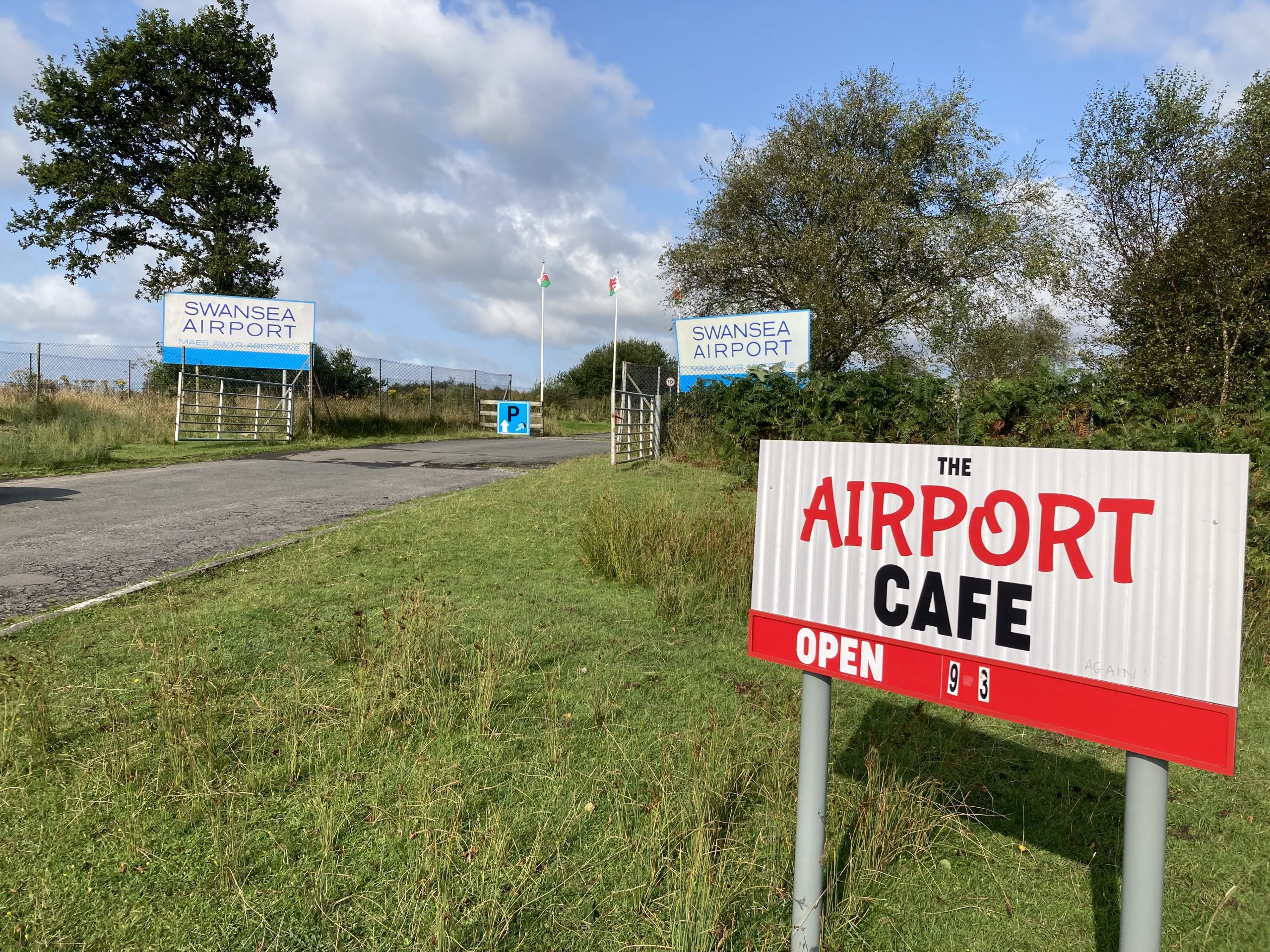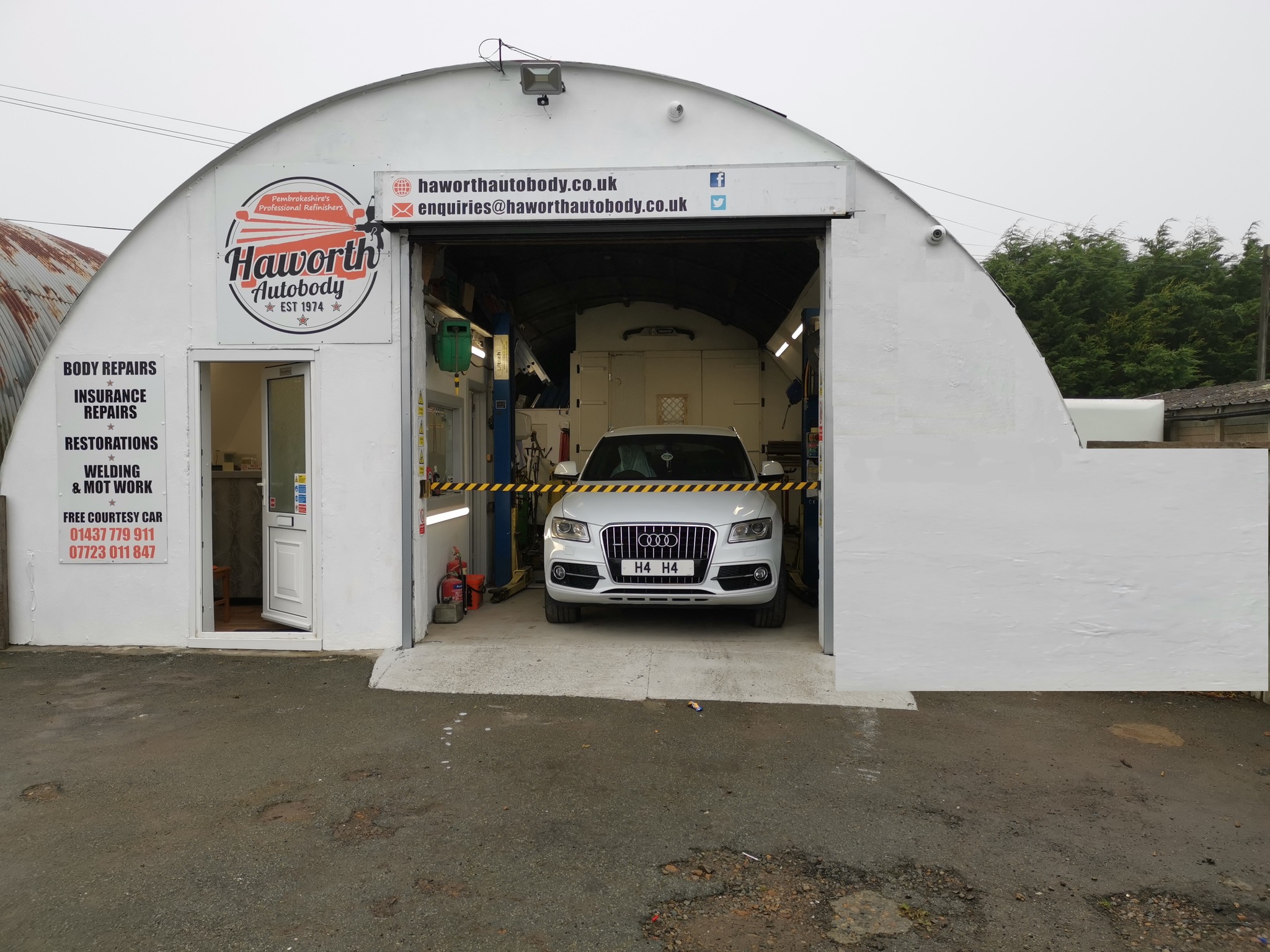Business
The past, present and future possibilities for Swansea Airport

SWANSEA Airport is turning a page shortly after a bumpy period which looked like it was heading to the courtroom.
Swansea Council, which owns but doesn’t run the airport, was taking steps to end the lease held by the current operator – citing a “range of issues” – when it announced at the beginning of August that the operator had agreed to relinquish it. A group representing users of the 450-acre Gower site is to take it over on a temporary basis.
Although court action was avoided there has been frustration on many sides – and in some cases still is – and a question mark lingers over the future of staff who work there currently.
Equally several people who have spoke to the Local Democracy Reporting Service have expressed their wish to look ahead and maximise what the Fairwood Common facility has to offer.

There aren’t many airports where pilots can soar above an area of outstanding natural beauty in largely unrestricted airspace surrounded on three sides by a coastline like Gower’s. The majority of aircraft which took part in last month’s Wales National Airshow refuelled there, and on the morning of August 23 six tradesmen were ordering breakfast at the reopened airport cafe.
Thousands of people will have fond memories of flights over the Bristol Channel or learning to fly in gliders as air cadets. Gower councillor Richard Lewis recalled arranging a half-term flight many years ago to Swansea from Taunton, Somerset, where he was at school at the time.
“There was a rail strike, so I organised the flight,” he said. “There was me and eight of my friends from the Swansea area. It was fantastic.” In later years he and a fellow councillor flew from the airport in a Lancaster bomber, and while serving as Lord Mayor of Swansea he and his daughter Francesca were taken up in a pair of gliders. “Fabulous,” he said.

There have been attempts over the years to run commercial passenger services from Swansea Airport – most latterly by Air Wales which flew to London City, Dublin, Jersey and Amsterdam – but demand wasn’t strong enough. The current operator, Swansea Airport Ltd, whose director Roy Thomas owned and subsidised Air Wales, announced plans in January last year to start a passenger service to Exeter but they didn’t come to fruition.
Swansea Council said is predecessor council was gifted the airport site and its land in 1938 and that the airfield was run by the authority until around 35 years ago except during the Second World War. The council said it didn’t have the in-house expertise to run such a facility. “Running an airport is a specialised activity, one that’s not within the core business of a council,” said a spokesman.
According to heritage website Coflein, the airfield was used by the RAF for Hurricane, Beaufighter and Spitfire squadrons from June 1941 onwards, ceasing in this capacity three years later when it become a training base solely. The airfield was targeted by enemy bombers, said the website, with one unexploded 1,000lb device apparently remaining in-situ until 1976 when it was extracted and taken to Whiteford Point, North Gower, for detonation.

After being decommissioned by the RAF the airfield went on to be used by private pilots, flying clubs and occasional fare-paying passenger services run by Cambrian Airways and, for a three-year period up to 2004, Air Wales. Wales Air Ambulance and RAF 636 air cadets glider squadron also had bases there.
The airport and its two runways are home now to two flying schools, a skydiving business and around 20 pilots, plus visitors flying in from elsewhere.
The soon-to-be-installed operator, Swansea Airport Stakeholders’ Alliance, said it wanted to support current users and safely operate the airport seven days a week, talk to potential investors, and offer opportunities to the community. An alliance spokesman said such opportunities could include buildings being available for community use, work experience for people with physical or learning disabilities, an expanded catering offer, and potentially a creche serving Gower.
He said there was no plan for commercial flights, partly because the Civil Aviation Authority (CAA) licence permitting these was suspended and did not transfer with the lease. The current aviation activities can take place without a CAA licence but the alliance stressed it would abide by CAA regulations.
Alliance members have visited small airports which have grown their business such as Sandown, Isle of Wight, and Sleap airfield, Shropshire. “Sandown had around the same number of movements 10 years ago when the current operator took over as we do now at Swansea – it now has almost 12 times as many,” said the alliance spokesman. “There are facilities for the local community. The place is buzzing.”
He added: “Sleap is an enormous success after being rescued. A hundred or more small aircraft go there for an event with folk bands and a barbecue. People are saying to me, ‘Why can’t we do that?’ Well, we can. We have to provide people with a reason for coming.”
The alliance has previously submitted a business plan to the council, and said it would work with the authority’s events team with a view to hosting events. But the spokesman said there would be no change of use of the land – for example house-building on part of it. “It’s legally, politically and practically impossible,” he said.
Asked about the staff currently working there, the spokesman said he sympathised with them but that he couldn’t say for sure what would happen until the alliance took over. He said there would have to be certain key roles filled such as airport manager and head of safety. He added: “We are also in the process of drawing up a revised scale of charges, but we’re not planning substantial rises.”
Phil Thomas, the airport’s current manager, said he was brought in by leaseholder Roy Thomas in March last year following a critical CAA audit which identified a “systemic failure of safety management”. Phil Thomas in turn brought in Peter Beales, operations manager, and with the small team of staff he said they’d successfully addressed all the most serious safety concerns and the majority of the less serious ones. He said the licence suspension was voluntary and that he felt the airport had done what it needed to address the outstanding matters, describing the situation as “immensely frustrating”.
Swansea Airport Ltd said the team had also brought an additional hangar into use, introduced an effective self-service fuelling system, increased the number of visiting aircraft, and made preparations for the reintroduction of grass runways. Phil Thomas said at least £20,000 had been spent on the airport’s fire appliance this year alone. He said the airport was staffed five days a week and that it operated on the other two, although pilots had to sign disclaimers on those days if they wanted to use it.
“This place has had its ups and downs,” he said. “It can be disheartening, but then you have days like the air show when 75% of the aircraft came here for fuelling and parking, and the place changes. I think all our staff are very professional – the rescue and fire-fighting guys are top drawer.”
He added: “We have worked with the alliance towards a safe transition. All we want it is a well-run airport which is operated safely, regardless of whose name is above the door.”
Operations manager Mr Beales said: “We would like to remain in-situ regardless of who’s taking it over, but we are passionate about the airport succeeding.”
Cambrian Flying Club has been based at the airport since 2009, offering flight training, hobby flying and flight experiences for the public. It has three two-seater and one four-seater aircraft. Operations manager Ben Clyde said the training provided was the “first rung in the ladder” towards a commercial pilot licence and that former trainees now flew planes for British Airways, Cathay Pacific and Ryanair, among others.
Mr Clyde said the company was started by his father and that he’d picked up the aviation bug as a boy, travelling to air shows. The 42-year-old took the family firm over around four years ago having worked as a business manager and building inspector, among other things. “We’ve currently got just under 150 students on our books,” he said. “It’s for all ages – we’ve got a 14-year-old up to people in their 90s.”
Mr Clyde said the club was part of the alliance and that he hoped the airport would become busier. Ideally he’d like to provide the next level up in commercial flight training. “I’m sure we can make a go of this,” he said.
Karl Nicholson, flight instructor at microlight outfit Gower Flight Centre, which also operates from the airport, said it had more than 100 learners on its books. “We all want a safe and thriving airport,” he said.
Carl Williams set up Skydive Swansea at the airport 18 years ago, building it up and eventually buying a plane worth more than £1 million. “It was the scariest signature I have ever put on paper,” he said. The company has since been acquired by a business called Go Skydive, with Mr Williams managing the Swansea operation on its behalf. Looking ahead to the alliance takeover, he said security of tenure was key. “Go Skydive are in a very good position going forward,” he said.
For Lisa Winter, co-owner of the airport cafe, the future feels very uncertain. She said she started working with leaseholder Roy Thomas last summer on plans to reopen the cafe, including a kitchen redesign. “We opened in May (2024), were closed for a brief period due to a plumbing problem, and re-opened again in July,” she said. “We have been building things up, and it’s starting to get really busy.”
The not-for-profit alliance said it intended to work towards reinstating the suspended CAA licence and would apply for a long-term tenancy when the council launched a competitive tender process at some point in the future.
Speaking earlier this month, Roy Thomas said he would also bid for a long-term lease when the opportunity arose. He has repeatedly said he has ploughed significant sums of money into the airport since he took it over in the early 2000s. “I took it from dereliction to a stage where it’s got a bright future,” he said. Mr Thomas said he’d never taken a salary, and he reiterated his call for an inquiry into the process which had led to the current turn of events.
Cllr Lewis said he wished the best for the airport. “I think there are opportunities,” he said. “My view is that there could be a small caravan site linked to it.”
Business
Pub rate relief welcomed but closures still feared

CAMRA warns one-year discount is only a sticking plaster as many Welsh locals face rising bills
A BUSINESS rates discount for Welsh pubs has been welcomed as a step in the right direction — but campaigners warn it will not be enough to stop more locals from shutting their doors.
The Campaign for Real Ale (CAMRA) says the Welsh Government’s decision to offer a 15 per cent reduction on business rates bills for the coming year will provide short-term breathing space for struggling publicans.
However, it believes the move fails to tackle deeper problems in the rating system that continue to pile pressure on community pubs across Wales, including in Pembrokeshire and Carmarthenshire.
Chris Charters, Director of CAMRA Wales, said: “Today’s announcement from the Finance Secretary that pubs will get 15% discount on their business rates bills is a welcome step.
“However, many pubs still face big hikes in their bills due to the rates revaluation which could still lead to more of our locals in Wales being forced to close for good.
“15% off for a year is only the start of supporting pubs with business rates. It won’t fix the unfair business rates system our pubs are being crushed by.”
He added: “Welsh publicans need a permanent solution, or doors will continue to close and communities will be shut away from these essential social hubs that help tackle loneliness and isolation.”
Mounting pressure on locals
Under plans announced by the Welsh Government, pubs will receive a temporary discount on their rates bills for the next financial year.
But CAMRA argues that many premises are simultaneously facing sharp increases following the latest revaluation, which recalculates rateable values based on property size and trading potential.
For some smaller, rural venues, especially those already operating on tight margins, the increases could wipe out the benefit of the relief entirely.
Publicans say they are also contending with rising energy costs, higher wages, supplier price hikes and changing customer habits since the pandemic.
In west Wales, several long-standing village pubs have either reduced their opening hours or put their businesses on the market in the past year, with landlords warning that overheads are becoming unsustainable.
Community role
Campaigners stress that the issue goes beyond beer sales.
Pubs are often described as the last remaining social spaces in small communities — hosting charity events, sports teams, live music and local groups.
In parts of rural Pembrokeshire, a pub can be the only public meeting place left after the loss of shops, banks and post offices.
CAMRA says supermarkets and online retailers enjoy structural advantages that traditional pubs cannot match, making it harder for locals to compete on price.
The organisation is now calling on ministers to introduce a permanently lower business rates multiplier for pubs, rather than relying on short-term discounts.
Long-term reform call
CAMRA wants whoever forms the next Welsh administration to commit to fundamental reform of the rating system, arguing that pubs should be recognised as community assets rather than treated like large commercial premises.
Without change, it warns, the number of closures is likely to accelerate.
Charters said: “This is about protecting the future of our locals. Once a pub shuts, it rarely reopens. We can’t afford to lose any more.”
For many communities across west Wales, the fear is simple: temporary relief may buy time — but it may not be enough to save the local.
Business
Haworth Autobody earns Which? Trusted Trader status

Family-run repair centre praised for workmanship, transparency and customer care
A FAMILY-RUN vehicle repair business has been recognised for its high standards of workmanship and customer service after securing national accreditation from Which? as a Trusted Trader.
Haworth Autobody Ltd, based in Haverfordwest, has built a loyal customer base through years of careful, precision repairs and a straightforward, customer-first approach. To earn the endorsement, the company underwent a detailed independent assessment examining not only technical skill and repair standards, but also business procedures, complaint handling systems and verified customer feedback.
The Which? Trusted Trader scheme is widely regarded as one of the most robust consumer approval programmes in the UK. Successful applicants must follow a strict code of conduct and agree to ongoing monitoring, with only a small proportion of businesses achieving the status.
Owner Bobby Haworth said the accreditation reflects values the company has always tried to uphold.
“We’ve always believed that doing the job properly, being upfront with customers and standing by our work is the only way to operate,” he said. “To have that approach independently recognised by Which? means a great deal to us and gives customers extra confidence when they choose us.”
For motorists, the recognition offers added peace of mind at a time when trust and transparency in vehicle repairs are more important than ever. Customers can expect clear communication throughout the process, honest and detailed estimates, and repairs carried out to a consistently high standard.
The workshop handles a wide range of services, including accident damage repairs, paintwork restoration and cosmetic bodywork, with an emphasis on quality workmanship and attention to detail.
Mr Haworth said the endorsement was not a finishing line but a foundation for continued improvement.
“We’re continuing to invest in staff training, modern equipment and new techniques to make sure standards stay high as we grow,” he added.
With consumer confidence increasingly tied to independent verification and proven reliability, the latest recognition reinforces Haworth Autobody’s standing as a trusted name in local vehicle repair.
Haworth Autobody Ltd
Unit 7, Snowdrop Lane, Haverfordwest, Pembrokeshire SA61 1ET
Tel: 01437 779911
Mobile: 07723 011847
Web: www.habody.com
Business
St Clears discount store in closing down sale after chain enters administration

A WELL-KNOWN discount retailer in St Clears is advertising a closing down sale after its parent company fell into administration, raising fresh concerns about the future of another high street store in west Wales.
The Original Factory Shop, which trades from Pentre Road in St Clears, has launched an “up to 30% off” sale as administrators attempt to secure the future of the business.
The chain, which sells clothing, homeware, garden products, toys and everyday essentials, appointed joint administrators Rick Harrison and James Clark of Interpath Advisory last week.
Founded in 1969, the retailer operates 137 stores across the UK and employs around 1,180 staff.
In a statement, Interpath said the company had faced difficult trading conditions common across the high street, including rising costs, weaker consumer spending and increased employment expenses. It added that problems with a third-party warehouse and logistics provider had also disrupted sales.
Despite the administration, the joint administrators say all stores will continue trading for now while options for the business are explored. The company’s online store is set to close.
Rick Harrison, managing director at Interpath and joint administrator, said the retailer had long been a fixture in town centres across the country but had struggled in the current climate.
Over the coming weeks, administrators will review whether parts of the business can be sold or restructured.
However, signage and social media posts from the St Clears branch suggest uncertainty locally, with the store promoting a closing down sale and urging shoppers to “grab a bargain while stocks last”.
The St Clears outlet is one of the last remaining branches in west Wales. Stores in Fishguard, Haverfordwest and Milford Haven closed last year. The Cardigan branch is also understood to be running a similar clearance sale.
The loss of another discount retailer would mark a further blow for smaller town centres already facing reduced footfall and rising costs.
-

 Health5 days ago
Health5 days agoConsultation reveals lack of public trust in health board
-

 News7 days ago
News7 days agoCaldey still unsafe, survivors warn — despite Abbey’s reform claims
-

 Community6 days ago
Community6 days agoPembrokeshire students speak at national Holocaust Memorial Day event
-

 News13 hours ago
News13 hours agoPrincess of Wales visits historic Pembrokeshire woollen mill
-

 News7 days ago
News7 days agoKurtz raises Gumfreston flooding in the Senedd as petition deadline nears
-

 Crime4 days ago
Crime4 days agoPembroke man accused of child sex offences sent to Swansea Crown Court
-

 Education6 days ago
Education6 days agoAttendance concerns at Milford School reflect wider issue raised at the Senedd
-

 Education6 days ago
Education6 days ago‘Vulnerable teen’ questioned by police at Milford Haven School




























